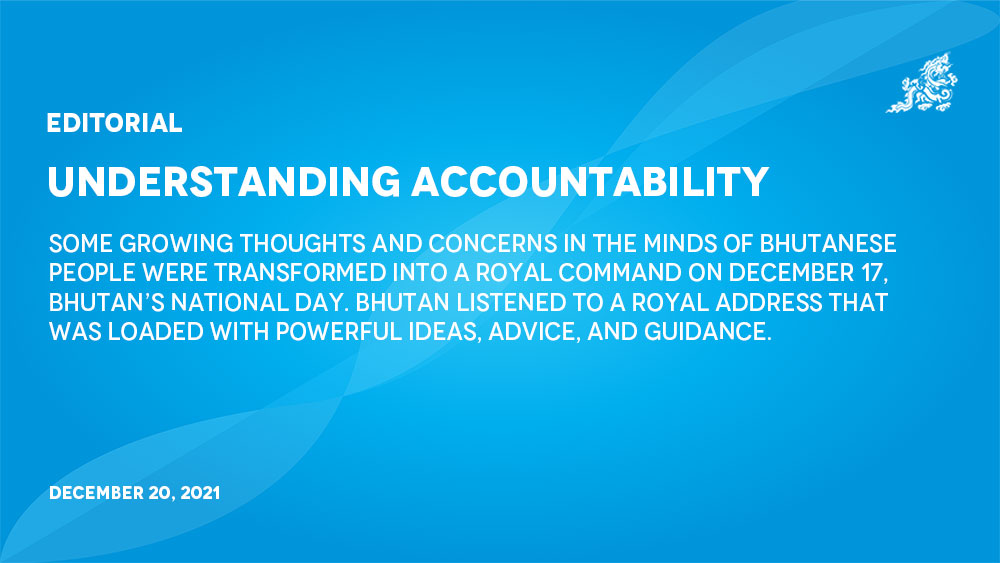Some growing thoughts and concerns in the minds of Bhutanese people were transformed into a Royal command on December 17, Bhutan’s National Day. Bhutan listened to a Royal address that was loaded with powerful ideas, advice, and guidance.
But our dilemma is that, too often in the past, ideas have been deeply appreciated but allowed to decay into rhetoric because we don’t act on them. His Majesty The King said that what we need is a corresponding degree of resolve and determination… how do we achieve that?
The first step may be to analyse the messages to understand them.
A key theme in the Royal address is accountability, linked to concerns like corruption, inequity and rule of law as well as complacency, inaction, incompetence, and other means of shirking our responsibilities. As this point sinks into the same Bhutanese minds, we ask “what next”?
The common understanding of accountability today is that we must call to task the decision-making layer of the public service – politicians, and senior bureaucrats responsible for the implementation of the country’s development. But accountability is critical to the effectiveness of, not just government, but governance, which means the functioning of society. We cannot overlook others who influence society, including big business houses and prominent citizens.
His Majesty The King referred to feedback from people. There is the belief (read allegation) that there are two laws in the country, inferring corruption in the form of nepotism and favouritism. This conventional wisdom says that, even when action is taken, “the big fish always get away”. Catching small fish will not solve the problem. The big fish must be caught – or stopped.
We also agree that, as we are often reminded from the Throne, we must also fulfil our responsibilities as citizens. For example, we have the mandate to vote responsibly for the right leaders and then to keep them accountable to their pledges and to society. As we all know, the regulatory environment is in place. We have a legal system, Constitutional bodies, local government, civil society, media – we all have voices and we can all influence the system.
What Bhutan heard from His Majesty The King was the most resounding call yet for decisive action against corruption, action strong enough to serve as deterrent. We should ensure that, when necessary, “heads must roll”.
Another strong perception among the people is that it is too late. This is because people feel the forces of inequity. For example, we look around us and ask, “Who owns all this? How did they accumulate it?” Some people run from office to office in the government, not being served. Some people plead in the courts and often find justice out of reach. We do not know how many Bhutanese businesses are owned by Bhutanese. There are many other examples.
But it is good that we are worried. It means we still recognise corruption. And we are worried about it. We live in a region where corruption is so ingrained that it has become an aspect of daily life. Corruption is synonymous with cultural identity for some societies that are resigned to such a fate.
We, Bhutanese, know what must be done. But to do it, we need to build our psyche and mettle and sharpen our resolve. An analogy for this process is the tempering of rough iron into fine steel.


